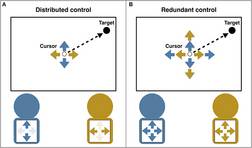Main content
Top content
25. June 2018 : A closer look at group benefits in joint perceptual tasks: distributed control vs redundant control - a big difference for the group performance

New publ.:
Wahn B, Karlinsky A, Schmitz L and König P (2018). Let's move it together: A review of group benefits in joint object control. A mini review. DOI:10.3389/fpsyg.2018.00918. Front Psychol 9:918
When two or more individuals coordinate their actions to jointly control an object (e.g., carrying a table), they may reach a higher performance compared to performing the same task alone — a group benefit. The present review by Wahn et al. integrates findings from previous studies for two types of joint control – "distributed control" and "redundant control" - to determine common principles and explain differing results.
Interestingly, they found that when control is distributed, individuals tend to outperform dyads or attain similar performance levels. For redundant control, conversely, dyads have been shown to outperform individuals. The authors suggest that these differences might be explained by the possibility to freely distribute control in line with individual capabilities, enabling them to maximize the benefit of the available skills in the group.

